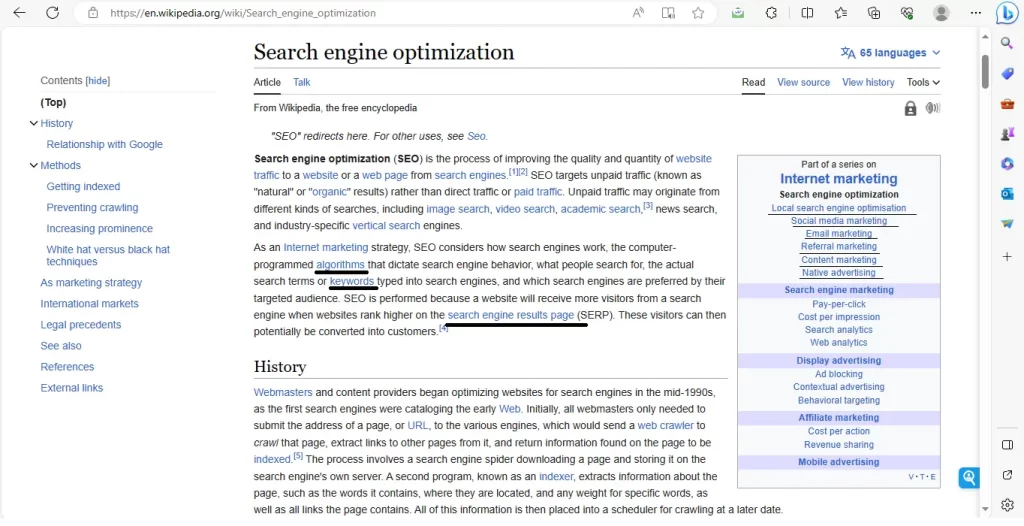In the vast realm of the internet, keywords are the guiding stars that connect people with the content they seek. Whether you’re a seasoned digital marketer or a newbie blogger, understanding the power of keywords is crucial. They’re the keys to unlocking visibility on search engine result pages (SERPs) and driving organic traffic to your website. In this guide, we’ll delve into the art of keyword brainstorming, and show you How to generate Keyword Ideas for SEO by revealing effective techniques that will help you generate a goldmine of keyword ideas. By the end, you’ll be armed with the knowledge to propel your SEO game to new heights.
1) Explore the Riches of Wikipedia:

Wikipedia isn’t just a treasure trove of information; it’s also a goldmine of keyword ideas waiting to be unearthed. Begin your keyword quest by searching for a topic related to your content. Let’s say you’re interested in writing about “SEO.” Input this term into Wikipedia’s search bar, and you’ll discover a wealth of keywords and related concepts on the topic.
But don’t stop there. Wikipedia pages are interconnected through hyperlinks. Click on these hyperlinks to explore subtopics and discover even more keywords. It’s like navigating a keyword labyrinth, with each click leading you to a new set of valuable.
2) Harness the Power of Ubersuggest:
Ubersuggest is a handy keyword research tool that can be your trusty sidekick in your quest for keywords. Enter a seed keyword, and Ubersuggest will present you with many keyword suggestions, including search volume, competition, and other vital metrics.
As you explore these suggestions, you’ll uncover many keywords related to your topic. Ubersuggest’s user interface makes it easy to filter and organize these keywords, helping you pinpoint the ones that resonate most with your content goals.
3) Dive into Keyword Sheeter:
Keyword Sheeter is your go-to option if you’re looking for a tool to churn out keyword ideas in bulk quickly. It does precisely what its name suggests – it sheets out keywords. Enter a seed keyword, and Keyword Sheeter will generate an extensive list of related terms.
The beauty of this tool lies in its ability to produce thousands of keyword ideas within seconds. While not all of them may be relevant to your content, it’s a goldmine for discovering hidden gems that can give your SEO strategy an edge.
4) Refine Your Keyword List with Google Keyword Planner:
Once you’ve amassed a substantial list of keyword ideas, it’s time to refine and prioritize them. Google Keyword Planner comes to the rescue here. This free tool provides valuable insights into each keyword’s search volume, competition level, and potential bid range if you’re considering paid advertising.
To use it, input your keywords into the planner. You’ll receive data that helps you identify which keywords are worth pursuing based on their search volume and competition. This step is crucial for ensuring that your SEO efforts are focused on the keywords that matter most to your target audience.

5) Utilize Google Trends:
Google Trends is a valuable tool for staying up-to-date with trending topics and, of course, for generating keyword ideas. It shows what people search for and how search interest changes over time. Enter a keyword or issue related to your content, and Google Trends will display data on its popularity and related queries.
You can identify keywords currently in demand by exploring trending topics and related queries. This helps with your SEO and ensures your content remains relevant to what your target audience is searching for.
6) Analyze Competitor Websites:
You can be inspired by your competitors when it comes to keywords. Take a look at the websites of your competitors in your niche. Pay attention to the keywords used in their content and meta tags. Tools like Ahrefs or SEMrush can help you analyze competitor keywords more comprehensively.
While you want to avoid copying their keywords outright, you can gain insights into the keywords that are performing well in your industry. Incorporate these insights into your keyword strategy to compete effectively in search results.
Things to Keep in Mind While Generating Keywords:
Long-Tail Keywords: The Hidden Treasures:
Long-tail keywords are more specific keyword phrases that can be a hidden gem for your SEO efforts. While they may have lower search volumes individually, they often convert better because they target a specific audience with a clear intent. For example, instead of targeting “shoes,” you might choose “comfortable running shoes for women.”
You can uncover these hidden treasures using tools like Google Keyword Planner or specialized long-tail keyword research tools. Long-tail keywords help you rank higher and attract a highly targeted audience interested in your content.
Don’t Forget About User Intent:
Understanding user intent is a vital aspect of keyword research. When people search for something online, they usually have a particular goal, such as informational, transactional, or navigational. Tailoring your keywords to match user intent is crucial for SEO success.
For instance, if someone is searching for the “best digital cameras,” their intent is likely to purchase. Therefore, you’d want to include keywords like “buy digital camera” or “digital camera deals” in your content if you’re selling cameras.
Stay Updated with Industry:
Every industry has its own set of and terminology. To connect with your target audience effectively, staying updated with the latest industry-specific keywords is essential. Participate in forums, read industry publications, and engage with your community to discover and incorporate relevant keywords into your content.
Keep Your Content Fresh:
Lastly, remember that keyword research is an ongoing process. To maintain your SEO edge, regularly revisit and update your keyword strategy. New trends, products, and changes in user behavior can all affect the keywords that perform best for your content.
To learn more about how to master SEO, Read our Blog.
In conclusion, keywords are the foundation of SEO success. By utilizing tools like Wikipedia, Ubersuggest, Keyword Sheeter, Google Keyword Planner, Google Trends, competitor analysis, long-tail keywords, understanding user intent, staying updated with industry jargon, and keeping your content fresh, you can generate a vast array of keyword ideas. With dedication and strategic implementation, these keywords will propel your content to new heights in the competitive landscape of the internet. So, armed with these techniques, embark on your keyword journey and watch your SEO efforts flourish. Happy keyword hunting!
For more SEO tips, follow us on Facebook, Instagram, and Twitter.


